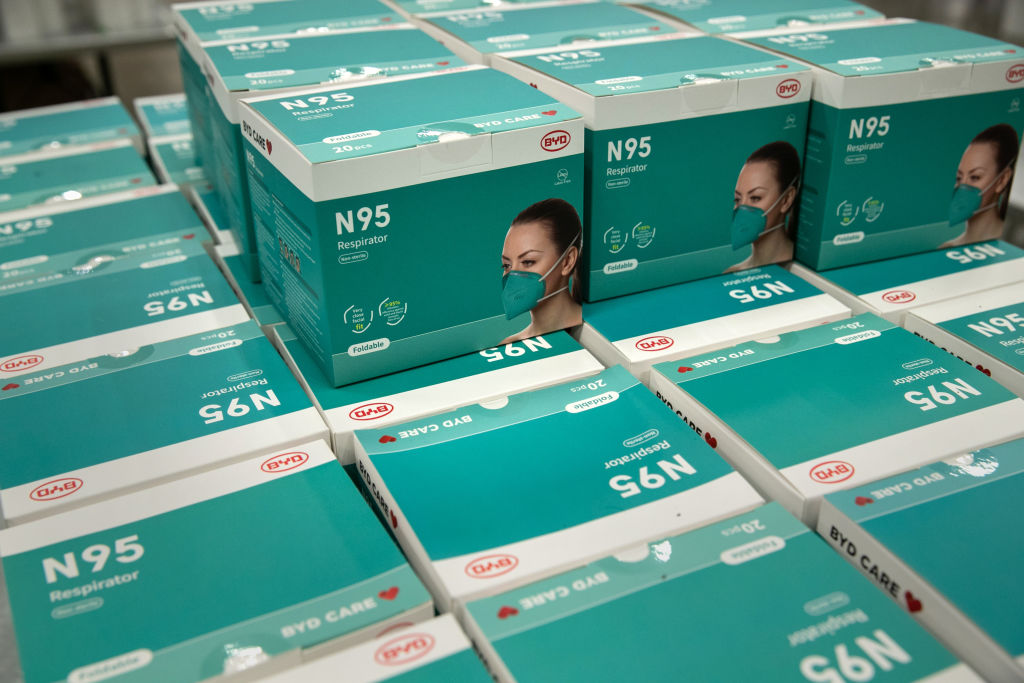A study re-shared by the National Institutes of Health (NIH) indicates that surgical N95 masks, considered by many experts to be a gold standard for protection against COVID-19, may expose wearers to dangerous levels of toxic volatile organic compounds (TVOCs).
Researchers from Jeonbuk National University in South Korea examined various types of disposable medical-grade masks and reusable cotton masks, finding that the chemicals released by these masks exceeded the recommended safety limit for TVOCs by up to eight times.
Prolonged and repeated inhalation of TVOCs has been linked to health issues such as headaches, nausea, organ damage, and even cancer. The researchers noted, “It is clear that particular attention must be paid to the VOCs associated with the use of KF94 [medical] masks [and] their effects on human health.” They suggested that the danger could be significantly reduced if masks were opened and left to sit for at least 30 minutes before use, indicating that mask packaging may play a role in chemical exposure.
READ: Experts Clamoring for Re-Imposition of COVID-19 Mask Mandates
Yet, the study did not measure the effect of people actually wearing the masks. Dr. Stuart Fischer, an internal medicine physician in New York, cautioned that strong conclusions couldn’t be drawn from the study. However, he acknowledged that increasing evidence has shown the drawbacks of mask-wearing, with “diminishing returns on the need for masks.”
In the study, researchers tested 14 disposable and cloth masks purchased online by measuring the amount of TVOCs in them. The disposable masks were KFAD and KF94 models, made from polypropylene and polyurethane nylon. These masks are popular in South Korea, whereas KN95s are more common in the U.S. The cloth masks were made from cotton, ramie (a vegetable fiber), and polyurethane.
The Environmental Protection Agency (EPA) recommends keeping TVOC levels below 0.5 parts per million in indoor air. However, the disposable masks contained up to 14 times more TVOCs than cotton masks, with the sample with the highest amount of TVOCs having about 4.8 parts per million, more than eight times the recommended limit.
TVOCs, which can irritate the eyes, nose, and throat, cause difficulty breathing and nausea, and damage the central nervous system and organs like the liver, according to the American Lung Association (ALA), are found in many household items including aerosol sprays, cleansers, disinfectants, moth repellents, air fresheners, and automotive products. Some TVOCs are even considered human carcinogens, capable of causing cancer.
The study’s findings add to a growing body of research suggesting that mask-wearing could cause more harm than good. For instance, research by the Cochrane Institute suggested that face masks made ‘little to no difference’ in COVID-19 infections and deaths. A controversial study also suggested that wearing face masks raises the risk of stillbirths, testicular dysfunction, and cognitive decline in children.
However, experts have criticized these studies for drawing conclusions without proper evidence. “It is indeed possible that certain masks have side effects, just as certain helpful medications (anti-histamines, psychotropic drugs, antibiotics) have side effects,” said Dr Fischer. “Almost everything in healthcare has a benefit/side effect profile.”
As the COVID-19 variant BA.2.86 spreads across the U.S., several universities, hospitals, and even Hollywood studio Lionsgate have reintroduced mask mandates (though, Lionsgate has walked back the mandate after intense public pressure). Yet, the newly discovered dangers of masks typically considered the most protective could render such mandates ineffective. “Extreme fears about the lethality of Covid may have led to decisions that were counterproductive,” Dr Fischer added. “Covid won’t be going away for a long time, if ever. We desperately need policies that do not fracture our society while providing minimal protection.”













